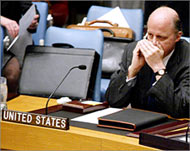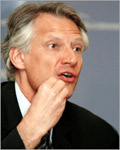New Iraq draft submitted
The United States and Britain have amended a draft resolution on Iraq at the UN, offering a greater role for the international body to win the widest possible backing.
 |
|
Negroponte: No more changes |
The draft will be put before the UN Security Council this week, according to US ambassador to the United Nations, John Negroponte.
“What we are going to propose to delegations is that they seek instructions (from their capitals) so that they will be prepared to vote from Wednesday forward,” Negroponte said.
This is the third draft that the United States has proposed. But the US ambassador hinted his country would not agree to any more changes.
“We never say never,” he said when asked if the draft was being offered on a take-it-or-leave-it basis. But “what we are signaling is that we have gone just about as far as we can in meeting the concerns that have been expressed by other delegations,” Negroponte said.
The two previous drafts failed to provide a clear idea about the responsibilities that a UN envoy to Iraq would handle.
The latest text calls the envoy “special representative” rather than “special co-ordinator”, saying he would “work intensively” with the United States and Britain to restore Iraqi institutions.
The UN envoy, which the draft said would have “independent” duties, would take part in promoting reconstruction, human rights, legal and judicial reform.
It is not clear if such missions assigned to the UN envoy would please France which has a veto power in the Security Council.
France concerned
The French Foreign Minister Dominique de Villepin has demanded the United Nations be given “a political role that is appropriate to what is at stake”.
 |
|
Villepin wants the UN |
A proposal that the UN representative report to the Security Council on his own work was left unchanged. Diplomats said France wanted the envoy to inform the council on the details of the formation of a new Iraqi government.
If adopted, the draft would authorise the occupying powers in Iraq to use oil revenues to rebuild the country. But France is concerned that its oil companies would lose the contracts they have signed with the toppled Iraqi government.
“I have been telling the French business leaders I meet that contracts would be honoured”, US ambassador to France, Howard H Leach, was quoted in the daily Le Figaro as saying
Leach said that businessmen “should not fear economic retribution”, promising that “the climate will improve, provided there is not another clash in the UN Security Council”.
Council diplomats said the draft would lead to ending the oil-for-food programme over six months rather than four as in an earlier text. The programme allows oil sales for the purchase of food and medicines.
UN inspection
The draft could lead to a possible return of UN arms inspectors to Iraq, though not immediately, according to diplomats.
In a related event, the US State Department rejected on Monday a request from the International Atomic Energy Agency (IAEA) to send a team back to Iraq to inspect nuclear sites that were reportedly looted.
State Department spokesman Richard Boucher said neither the IAEA nor the UN Monitoring, Verification and Inspection Commission (UNMOVIC) had the resources or ability to operate in the uncertain situation on the ground.
“Certainly, we don’t think it’s time for the UNMOVIC inspectors to begin going back and, as you still have a largely military situation, I wouldn’t speculate really one way or the other at what time that might be appropriate,” Boucher told reporters.
He added that coalition forces were “best positioned to do this work”.
His comments came a day after IAEA chief, Mohammed al-Baradei, said UN arms inspectors must go back to Iraq and finish the task commissioned to them by the UN Security Council.
“We are the ones with the most … experience. We know whom to interview, we know what to do, and we will definitely be much more efficient completing that job than any coalition could,” he said.
Al-Baradei was responsible for supervising UN inspections for atomic weapons in Iraq before the war.
The IAEA fears that material obtained by looters, such as radioactive matter, could pose health problems to the civilian population.